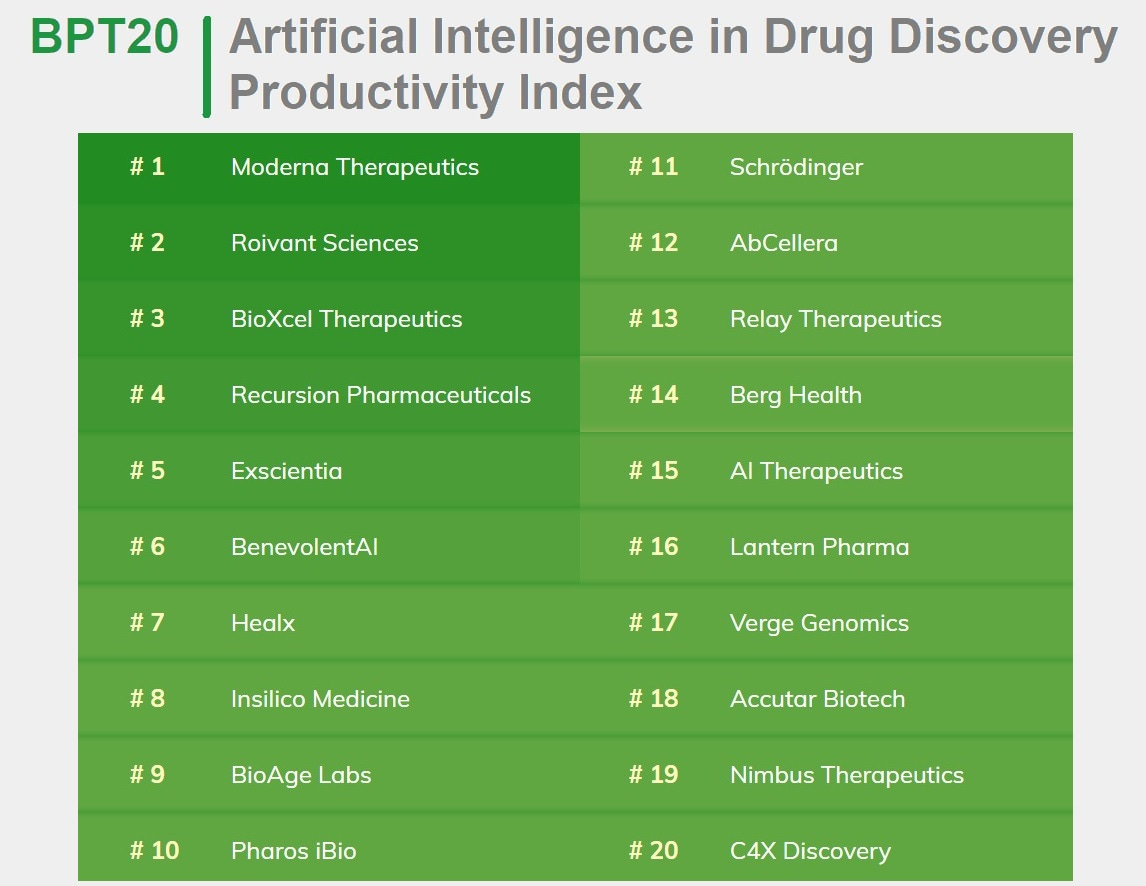The Evolution of AI in Drug Discovery Sector
Several studies benchmarking AI adoption in pharma/biotech. Also, reflections on a rapidly changing paradigm of AI in drug discovery.
Hi! I am Andrii Buvailo, and this is my weekly newsletter, ‘Where Tech Meets Bio,’ where I talk about technologies, breakthroughs, and great companies moving the industry forward.
If you've received it, then you either subscribed or someone forwarded it to you. If the latter is the case, subscribe by pressing this button:
Now, let’s get to this week’s topics!
Below, I've compiled three recent studies rating various pharmaceutical companies in terms of either their adoption of advanced AI technologies or their productivity—i.e., how well AI is used to achieve results (for instance, generating molecules that reach clinical studies).
The first study is by CB Insights: The Pharma AI Readiness Index.
It evaluates the AI preparedness of leading pharmaceutical companies. This index ranks companies based on metrics like AI talent acquisition, project execution, and innovative prowess, utilizing datasets such as patents, partnerships, and product launches. Notably, Roche and Bayer have emerged as frontrunners due to their significant AI-related investments and initiatives. Firms like Eli Lilly and Company, AstraZeneca, and Sanofi are actively integrating AI.
Another study is by Christian Rutzer, Deputy Head of CIEB Universität Basel.
The analysis looks at how many publications by various pharmaceutical companies are related to AI-based research. The study methodology employed keyword searches in paper titles and abstracts from Scopus data.
According to this study, Swiss company Novartis emerges as a pioneer, with over 3% of its scientific publications between 2020 and 2022 highlighting AI applications. Following closely are Germany's Boehringer Ingelheim at 2.5% and the UK's AstraZeneca at 2%. As Dr. Christian Rutzer, Deputy Head CIEB University of Basel, comments on the results of this study, it's been observed that large US pharmaceutical companies have a slower AI incorporation rate in research compared to their European peers. Novartis's dominance, for example, might be influenced by its focus on big data, further amplified by its collaboration with Palantir Technologies.
This situation seems a bit counterintuitive to me, considering how many AI projects are being implemented in the US life science hubs, such as Boston, San Francisco, or San Diego, but these are the numbers. The study methodology is this:
”The analysis is based on Scopus data. We identified AI papers in pharma papers by keyword searches of paper titles and abstracts using the following terms: deep learning, natural language processing, machine learning, machine intelligence, artificial intelligence, ai technology, supervised learning,
learning algorithm, unsupervised learning, reinforcement learning”.
Finally, here is a 2022 study by BiopharmaTrend.com looking at how AI-driven emerging companies are using AI technology to accelerate drug candidate discovery and progression towards clinical trials.
In this study, disclosed information about the preclinical and clinical pipelines of more than 130 AI-driven companies was analyzed, and the 20 most productive companies were selected to build the BPT20 Artificial Intelligence in Drug Discovery Productivity Index. A formula used to calculate the index takes into account the number of drug candidates in various clinical trial stages, the number of preclinical candidates, and how long the companies have been on the market, as well as some other factors. It is calculated as a polinom, applying various weights to the corresponding variables and giving the resulting coefficient. The simple sorting of the coefficients for the 20 companies leads to the BPT20 index.
So, the company's position in the BPT20 index reflects its performance relative to the other 19 members. We are hoping to release the 2023 edition of the BPT20 index by the end of the year (some companies advanced heavily, while there were also setbacks in some others, like insufficiently optimistic results in this phase 2a trial, where the AI-inspired topical pan-Trk inhibitor failed to improve eczema symptoms or itch).
You can explore clinical-stage molecules by some of these companies in an interactive table here (only the leading drug candidates in each case were selected to be included in the table): The Roadmap of Drug Candidates Designed by AI.
The Paradigm of AI in Drug Discovery is Changing
Now, let’s discuss a quite profound change in the medical and life science AI fields, affecting how life science companies will be building and collaborating.





